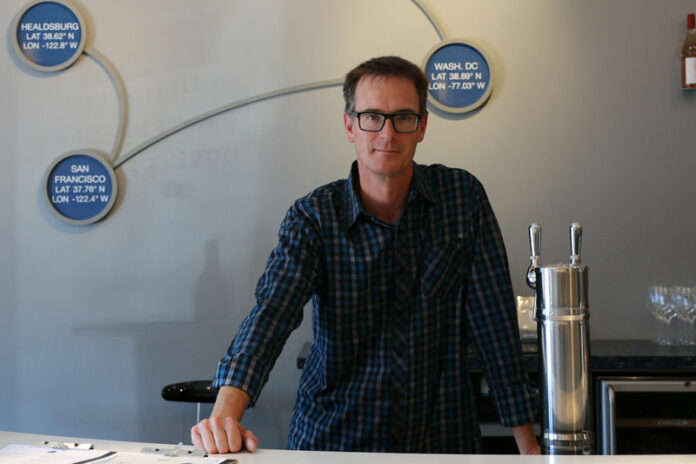Council open to ‘front loading’ tourism marketing to offset post-fire economic doldrums
The Healdsburg City Council had barely begun to discuss how to approach tourism marketing in the community on Monday night when members of a packed audience at City Hall let their feelings be known.
“People in this community have their businesses on the line,” said an exasperated Alan Baker, owner of Cartograph Wines. “Pissing and moaning over 90 grand is foolish,” he said, referring to a council discussion over what might be done to modify the Healdsburg Tourism Improvement District’s (HTID) annual $600,000 budget in increments of 15 percent ($90,000).
Other speakers at Monday night’s meeting used less colorful language, but were no less passionate about the ripple effect of the recent firestorms.
Ariel Kelley, board chair of Corazón Healdsburg, told the council that Corazón clients, many of whom work in service jobs, are suffering.
“People who are served by Corazón got laid off and it hasn’t come back,” Kelley said. “If no one slept in that hotel room last night, it doesn’t need to be cleaned. People with shift work are not getting hours. The impact of the fires has exacerbated the economic divide in our community.”
Brian Sommer, manager of Les Mars Hotel and head of the HTID board, said Napa County is spending millions to attract visitors and competing is difficult, especially when national media is painting a picture of Sonoma County destroyed by fire.
Other speakers reminded the council that tourism brings ancillary benefits that echo throughout the community.
Debbie Mason, CEO of Healthcare Foundation Northern Sonoma County, said funds that her foundation receives to support local healthcare don’t always come from locals. “The money that went to improving Healdsburg District Hospital, about half that money came from second home owners,” Mason said.
Denny Drowty reminded the council that most of the transient occupancy tax (TOT) collected by lodging establishments is used for community services, such as the senior center, community center and parks maintenance.
“If we don’t get people into our hotels we will have bigger problems than our restaurants. We have to sustain the basic infrastructure that TOT supports,” Drowty said.
The council got the message, mostly. Councilmember Brigette Mansell said she needs, “more information than what’s been given to me tonight.”
Councilmember Leah Gold said she wants the lodging establishments to disclose their occupancy rates and councilmember Joe Naujokas wondered how those occupancy rates could be shared in secret with the council and kept from public knowledge.
Gold said she supports the extension of the HTID, the original topic of the discussion. “Everybody here on the dais is very interested in the health of our tourist-serving businesses,” she said.
Mayor Shaun McCaffery reminded the council that he was originally against the city renewing the HTID, which uses the city’s taxing authority to collect 2 percent on top of the regular bed tax to use for marketing.
“But, I really like this plan,” McCaffery said Monday night.
In response to concerns that Healdsburg now has to compete not only with Napa and other visitor destinations, it also has to compete against the “destroyed by fire” myth, McCaffery and other council members discussed “front loading” marketing funds for a couple of years while the Healdsburg economy catches up.
The matter will be back before the city council on Monday, Nov. 20 at 6 p.m. at Healdsburg City Hall.
58
F
Healdsburg
November 17, 2024








